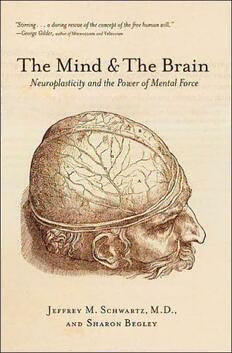
The Mind and the Brain PDF
02002·1.668 MB·English
Most books are stored in the elastic cloud where traffic is expensive. For this reason, we have a limit on daily download.
Preview The Mind and the Brain
Description:
From Publishers WeeklySchwartz (A Return to Innocence), a UCLA psychiatrist and expert on treating patients with obsessive compulsive disorder (OCD), teams up with Begley, a Wall Street Journal science columnist, to explore the mind/brain dichotomy and to discuss the science behind new treatments being developed for a host of brain dysfunctions. Building on the work presented in Schwartz's first book, Brain Lock, the authors begin by demonstrating that OCD patients are capable of rechanneling compulsive urges into more socially acceptable activities and that, by doing so, they actually alter their brains' neuronal circuitry. By presenting a wide array of animal and human experiments, Schwartz and Begley show that similar neuroplasticity is possible in stroke victims, often leading to a return of function previously thought impossible. The medical results and treatments they summarize are exciting and deserve widespread attention. In a chapter entitled "Free Will and Free Won't," the authors turn to the philosophical, examining the implications neuroplasticity might have on the differences between mind and brain; they also discourse on the existence of free will. Unfortunately, their integration of quantum mechanics and Buddhism into a search for a mechanism to explain the patterns scientists have been discovering is too superficial to fully engage readers. Nonetheless, a great deal in this book is sure to motivate discussion and more research.Copyright 2002 Reed Business Information, Inc. From BooklistSchwartz's undergraduate major was philosophy, and that interest as well as Buddhism has broadened his outlook and makes this book potentially attractive to more readers than those habitually interested in "brain science." Psychiatrist Schwartz pioneered the use of positron-emission tomography in studying obsessive-compulsive disorder (OCD). The behaviorists' therapeutic use of the often-harsh exposure and prevention method with OCD struck Schwartz as brutal and unproductive. Searching for a new approach, he gradually developed the four-step method that he and science writer Begley thoroughly describe here. Employing the Buddhist idea of willful mindfulness, Schwartz and his colleagues enjoyed considerable research and clinical success. A long, informal collaboration with physicist Henry Stapp enabled Schwartz to overcome the problem of free will and moral action, and one of his major achievements was proving the neuroplasticity of the adult brain, thanks to which the formation of new transmission routes coincides with that of new neurons. Schwartz and Begley bring to life the thinking and work of many original investigators in a book that thoughtful readers will enjoy. William BeattyCopyright American Library Association. All rights reserved
See more
The list of books you might like
Most books are stored in the elastic cloud where traffic is expensive. For this reason, we have a limit on daily download.
